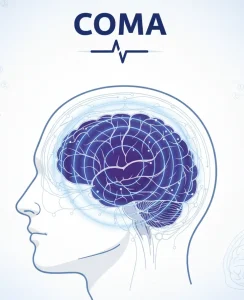Overview
A coma is a state of prolonged unconsciousness in which a person is unresponsive to their environment and cannot be awakened, even with vigorous stimulation. It results from significant damage or disruption to the brain, often affecting areas responsible for consciousness, such as the cerebral cortex or brainstem.
Comas can last from hours to weeks or longer, depending on the cause and severity of brain injury. The condition is a medical emergency requiring immediate evaluation and supportive care.
Symptoms
A person in a coma shows varying levels of unresponsiveness depending on severity.
Common signs include:
-
Unresponsiveness to verbal commands or physical stimuli
-
Lack of awareness of surroundings
-
Absence of purposeful movement
-
Eyes closed most or all of the time
-
Irregular breathing patterns
-
Reduced or absent reflexes
-
In some cases, involuntary movements or eye opening may occur
The level of consciousness is usually assessed using the Glasgow Coma Scale.
Causes
Comas are caused by conditions that significantly impair brain function.
Common causes include:
-
Severe head injury or traumatic brain injury
-
Stroke or brain hemorrhage
-
Lack of oxygen to the brain (hypoxia or anoxia)
-
Brain infections such as meningitis or encephalitis
-
Metabolic imbalances, including low blood sugar or liver/kidney failure
-
Drug or alcohol overdose
-
Seizures or status epilepticus
-
Brain tumors or pressure from swelling
The underlying cause determines prognosis and treatment approach.
Risk Factors
Certain factors increase the risk of developing a coma:
-
Traumatic brain injury from accidents or falls
-
Stroke or cardiovascular disease
-
Severe infections affecting the brain
-
Chronic substance abuse
-
Diabetes or other conditions affecting metabolism
-
Advanced age, which increases vulnerability to injury and stroke
Complications
Comas can lead to severe complications, depending on duration and brain involvement.
Possible complications include:
-
Brain death or irreversible brain damage
-
Persistent vegetative state or minimally conscious state
-
Respiratory failure requiring mechanical ventilation
-
Infections, such as pneumonia or urinary tract infections
-
Bedsores due to immobility
-
Muscle atrophy or contractures
-
Long-term cognitive and physical impairments after recovery
Prevention
While not all comas can be prevented, certain measures reduce the risk:
-
Wearing seat belts and helmets to prevent head injuries
-
Managing chronic conditions such as diabetes and hypertension
-
Avoiding substance abuse and overdose risks
-
Prompt treatment of infections affecting the brain
-
Maintaining a healthy lifestyle to reduce stroke risk
Early medical intervention and supportive care improve outcomes for individuals in a coma.
Advertisement

